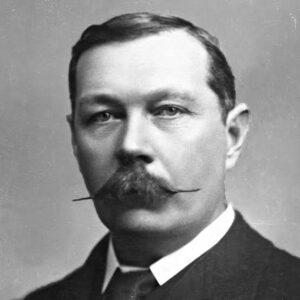Arthur Conan Doyle is perhaps best known as the creator of the legendary detective character, Sherlock Holmes for adventure stories. However, his contributions to British literature during the Victorian era extend beyond this iconic figure.
Born as Sir Arthur Ignatius Conan Doyle in Edinburgh, Scotland in 1859, he went on to pursue writing as a career. His literary works spanned a wide range of genres, from mystery novels to historical fiction. Doyle’s life, works, and legacy continue to fascinate readers and inspire writers today.
Key Takeaways:
- Arthur Conan Doyle is known for creating Sherlock Holmes, one of the most iconic detective characters in British literature.
- Doyle’s literary contributions extended beyond Sherlock Holmes, including works in various genres such as historical fiction.
- Doyle lived during the Victorian era, which greatly influenced his writing.
- His work has had a significant impact on subsequent detective fiction and popular culture.
- Doyle’s legacy continues to fascinate readers and writers around the world.
Early Life and Career of Arthur Conan Doyle
Arthur Conan Doyle, also known as Sir Arthur Ignatius Conan Doyle, was born on May 22, 1859, in Edinburgh, Scotland. He was the third child of ten in a prosperous Catholic family. His father, Charles Altamont Doyle, was an alcoholic artist, and his mother, Mary Foley, was a homemaker.
Conan Doyle had a strict Catholic upbringing and attended Jesuit schools. Although he excelled in his studies, he disliked the strict discipline and left Stonyhurst College at the age of 17. He then attended the University of Edinburgh to study medicine, where he met Dr. Joseph Bell, whose deductive reasoning skills would influence the creation of Sherlock Holmes.
After graduation, Conan Doyle worked as a ship’s doctor and wrote his first short stories. He then opened a medical practice in Southsea, England, but had difficulty attracting patients. To supplement his income, he began to write more regularly and eventually sold his first Sherlock Holmes story, A Study in Scarlet, to a magazine in 1887. The story was an instant success, and Conan Doyle would go on to write numerous books and short stories featuring the famous detective.
The Victorian Era
The Victorian era was a time of significant social, economic, and cultural change in England, characterized by strict social norms, industrialization, and technological advancements. These developments had a profound impact on literature, as authors began to reflect on the changes in society and its effect on the individual. Conan Doyle’s work reflected many of these concerns, as he used Sherlock Holmes to explore issues related to crime, justice, and morality.
The Creation of Sherlock Holmes
Arthur Conan Doyle’s fascination with detective stories inspired him to create the world-famous detective, Sherlock Holmes. Doyle’s personal experiences as a writer also played a crucial role in the development of this character. He modelled many of Holmes’ quirks after himself, including his unwavering attention to detail and excellent deductive skills.
The complex and intriguing personality of the detective, coupled with the nail-biting mysteries he solved, made Sherlock Holmes an instant hit with readers. The character became a cultural icon and revolutionized the crime fiction and mystery novel genres. The adventures of Sherlock Holmes, published in various collections, remain some of the most popular works in British literature to this day.
“When you have eliminated the impossible, whatever remains, however improbable, must be the truth.” – Sherlock Holmes in The Sign of Four
Some of the most popular Sherlock Holmes stories
Doyle wrote 56 short stories and four novels featuring Sherlock Holmes. Some of the most popular stories include:
- The Hound of the Baskervilles
- A Study in Scarlet
- The Adventure of the Speckled Band
- The Red-headed League
The enduring appeal of the Sherlock Holmes stories is due, in part, to their ability to keep readers on the edge of their seats while showcasing the brilliance and eccentricities of the one and only Sherlock Holmes.
Legacy and Literary Contributions of Arthur Conan Doyle
Arthur Conan Doyle’s legacy extends well beyond the iconic character of Sherlock Holmes. His literary contributions to British literature during the Victorian era have made a significant impact on subsequent literary works.
Beyond Sherlock Holmes, Doyle’s other literary works encompass various genres, including historical novels, science fiction, and supernatural stories. He was a prolific writer who explored different themes and styles, showcasing his versatility as an author.
Doyle’s influence on subsequent detective fiction has been profound. He set the standards for crime fiction and mystery novels, creating a template that many authors have followed. He also introduced forensic science to detective stories, adding a touch of realism to the genre.
Moreover, Doyle’s portrayal of the Victorian era through Sherlock Holmes has become the benchmark for depicting the time period. His vivid descriptions of the society, culture, and politics of the era have helped readers understand the nuances of the time period.
It is no surprise that Doyle’s contributions to British literature have been recognized and celebrated. He was knighted for his literary achievements and has received numerous accolades for his works. His impact on British literature is undeniable, and his works continue to be popular today.
In conclusion, Arthur Conan Doyle’s literary contributions, particularly through the creation of Sherlock Holmes, have left a lasting legacy on British literature. His impact on the portrayal of the Victorian era and the detective fiction genre will continue to influence future generations of readers and writers.
